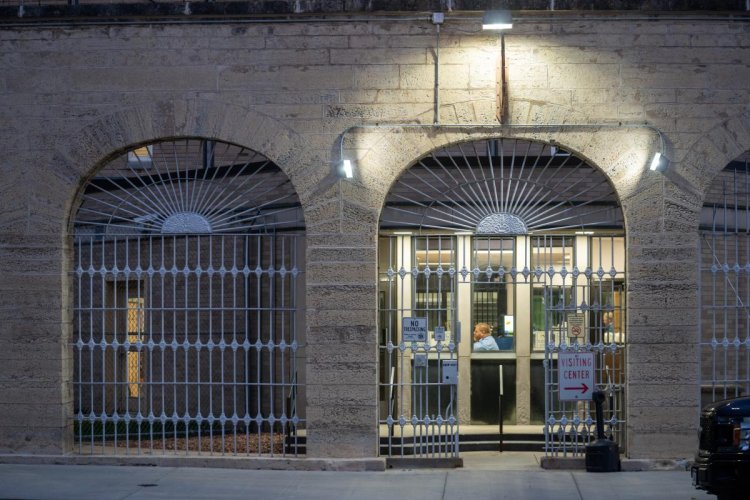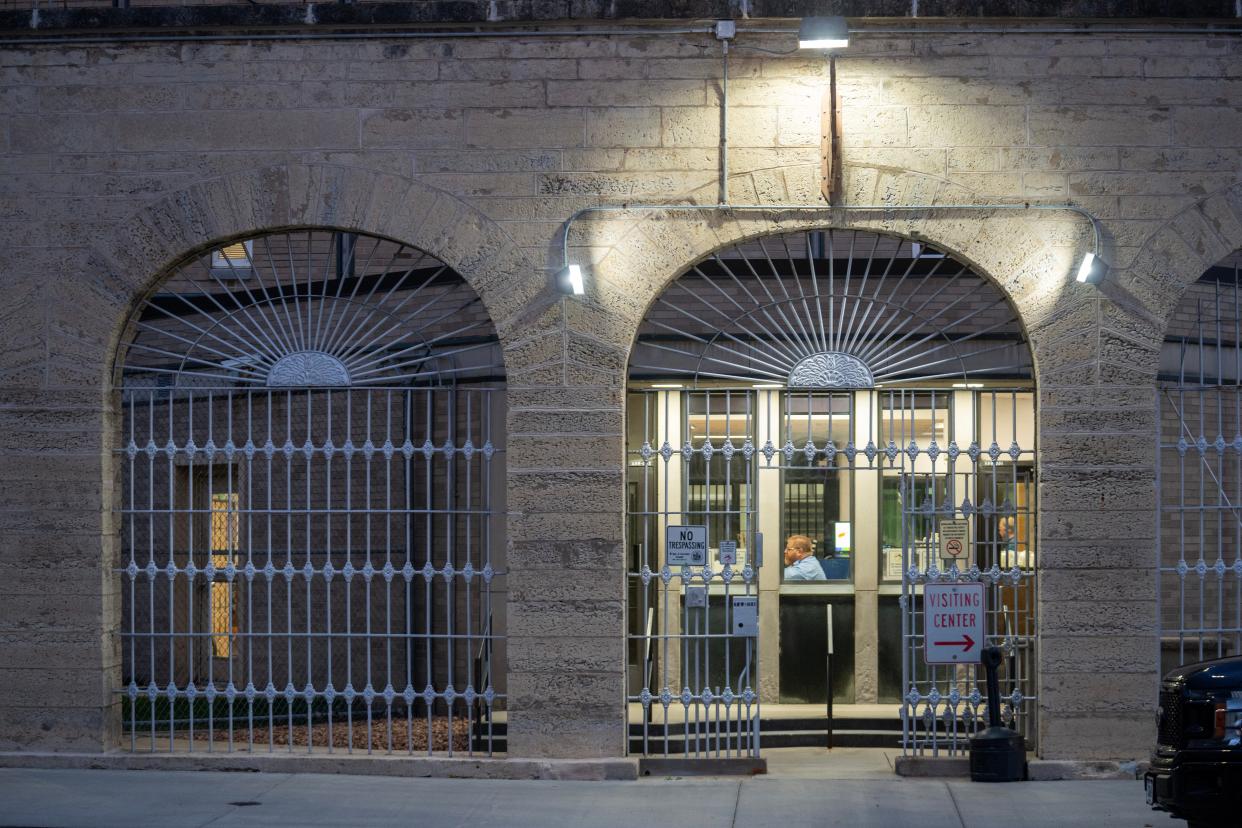Deaths, lockdowns and overcrowding. What's going on in Wisconsin's prisons?
Wisconsin's prisons are overcrowded and understaffed while facilities in Green Bay, Stanley and Waupun have been under lockdown for months.A lockdown, also called "modified movement," means there are no visitors, and prisoners have little time outside their cells.Department of Corrections spokesman Kevin Hoffman has told the USA TODAY NETWORK-Wisconsin that Stanley's situation is different from what is happening in Green Bay and Waupun. Those incarcerated at Stanley, which is in Chippewa County, still have access to some recreation, visits and vocational programs, he said.All the while, more people are in "restrictive housing" across the state's prison system.ADVERTISEMENTAdvertisementAkin to solitary confinement, those in restrictive housing are housed alone, cannot visit the cafeteria and rarely leave their cells, except to shower. In August, the state had the highest number of prisoners in restrictive housing since May 2019.The state's prisons have also been plagued with other probl


Wisconsin's prisons are overcrowded and understaffed while facilities in Green Bay, Stanley and Waupun have been under lockdown for months.
A lockdown, also called "modified movement," means there are no visitors, and prisoners have little time outside their cells.
Department of Corrections spokesman Kevin Hoffman has told the USA TODAY NETWORK-Wisconsin that Stanley's situation is different from what is happening in Green Bay and Waupun. Those incarcerated at Stanley, which is in Chippewa County, still have access to some recreation, visits and vocational programs, he said.
All the while, more people are in "restrictive housing" across the state's prison system.
Akin to solitary confinement, those in restrictive housing are housed alone, cannot visit the cafeteria and rarely leave their cells, except to shower. In August, the state had the highest number of prisoners in restrictive housing since May 2019.
The state's prisons have also been plagued with other problems. Here's what you need to know about conditions inside the prisons:
Deaths and rodent infestations reported in several prisons
Two deaths have been reported this year at Waupun Correctional Institution, a maximum security prison that has been on lockdown since March. Dean Hoffman, 60, died by suicide in June. Tyshun L. Lemons, 30, died in early October. The cause and manner of his death remain under investigation.
Police in Fond du Lac are investigating a July death at the all-female, maximum-security Taycheedah Correctional Institution. Cindy Schulz-Juedes, 68, was found unresponsive in her cell. Police believed her death was a homicide and have referred a suspect to prosecutors for potential charges.
In 2019, a woman died of sepsis the day after she was transferred from Taycheedah to a local hospital. The prison was overcrowded by 200 prisoners then, as it is now, according to Department of Corrections' prison population counts from Oct. 13 and June 2019.
Earlier this year, advocates for those incarcerated at Green Bay Correctional Institution said the facility was infested with rodents. The problem was so bad that people housed at the maximum security prison were rolling up towels and placing them at their cell doors to prevent mice from getting in, they said.
Kevin Hoffman, the agency spokesman, has said the rodent issue had been handled.
Wisconsin's prisons are vastly understaffed, with some facilities having more than 40% vacancy rates
Wisconsin has a 32% staff vacancy rate across all its prisons. Maximum- and medium-security facilities are bearing the brunt of low staffing levels:
Waupun is the most understaffed prison in the state, missing over half the employees it needs as of Oct. 7.
Maximum-security prisons in Columbia County, Dodge County and Green Bay have staff vacancy rates over 40%.
Taycheedah and the Wisconsin Secure Facility Program in Grant County are both running with only two-thirds of the needed staff.
The medium security prisons Kettle Moraine, which is in Sheboygan County, and Stanley have vacancy rates at 47% and 44%, respectively.
Understaffed prisons also report prisoner overcrowding
While prisons are struggling to operate, many of the maximum- and medium-security facilities are overcrowded.
Waupun is designed for about 880 prisoners despite a population of more than 1,000, according to Oct. 13 data from the Department of Corrections.
More on Waupun Correctional ‘He didn't deserve to die like this’: Family seeks answers about suicide during Waupun prison lockdown
Dodge Correctional Institution is over capacity by 400 prisoners, while both Green Bay and Taycheedah are over by 200.
Stanley has been operating over capacity by 50 to 100 prisoners for years.
This summer, more prisoners were in restrictive housing than in the last four years
Given the understaffing and overcrowding, restrictive housing has been on the rise.
It's used in two ways: administrative and disciplinary.
Administrative restrictive housing is when a prisoner is separated from the general population because they pose a danger to others and previous disciplinary action hasn't worked. Those in administrative restrictive housing have their cases reviewed on a monthly basis to see whether they can be moved back to the general population.
Disciplinary restrictive housing separates a prisoner from the general population because of a violation that can include disobeying orders, assault, disrespect or misusing medication, among other things.
Both types of restrictive housing mean a loss of privileges and isolation, similar to the conditions of a lockdown and solitary confinement.
In August, there were 957 people in restrictive housing, the highest since May 2019. Most prisoners in restrictive housing are there for disciplinary violations. Of that number, 122 — the highest number since 2019 — have a serious mental illness like depression or bipolar disorder.
Similar trends exist in the Columbia, Green Bay and Waupun prisons.
All three of those prisons had the highest number of prisoners with serious mental illnesses living in restrictive housing since January 2019. That's the farthest back the Department of Corrections' online data goes.
Research shows that restrictive housing, particularly in a single cell, is significantly correlated with prisoner suicide, according to a 2016 literature review by the National Institute of Justice.
Statewide, assaults on staff are at their highest in a decade
Across the state, assaults on correctional staff reached an all-time high in fiscal year 2023, which ran from July 1, 2022, to June 30.
There were 378 attempted and actual assaults on staff including battery, physical injury, sexual assault, spitting or throwing a bodily substance at employees. Assaults haven't been that high in over a decade, according to agency data.
Columbia, Green Bay and Waupun accounted for over half of the total assaults on staff in fiscal year 2023. Waupun itself had 135 attempted or completed assaults, making up 35% of all assaults.
In the first few months of the new fiscal year, there have been 32 assaults statewide.
Correctional employees do not recommend working at prisons, cite low pay as a reason to leave
The majority of agency workers say that if they left the Department of Corrections, it would be because of pay, according to a 2022 employee survey.
The state Legislature approved a pay increase for correctional officers that kicks in this week, hoping to ease the shortage. Wages will jump from about $22 an hour to $33.
At Waupun, which has a 53% staff vacancy rate, more than half of the employees would not recommend working at the agency, and the majority said they don't have enough flexibility for family and personal needs.
Employee sentiments are similar at Columbia, Dodge, Green Bay and Stanley, all of which have high staff vacancy rates.
Danielle DuClos is a Report for America corps member who covers K-12 education for the Green Bay Press-Gazette. Contact her at [email protected]. Follow on Twitter @danielle_duclos. You can directly support her work with a tax-deductible donation at GreenBayPressGazette.com/RFA or by check made out to The GroundTruth Project with subject line Report for America Green Bay Press Gazette Campaign. Address: The GroundTruth Project, Lockbox Services, 9450 SW Gemini Drive, PMB 46837, Beaverton, Oregon 97008-7105
This article originally appeared on Green Bay Press-Gazette: Deaths, lockdowns and overcrowding. What's going on in Wisconsin's prisons?
What's Your Reaction?













